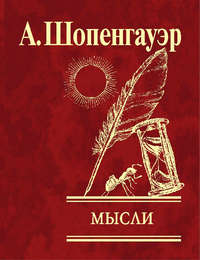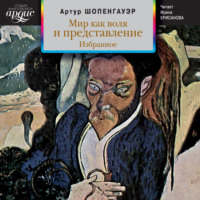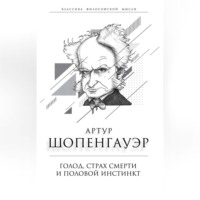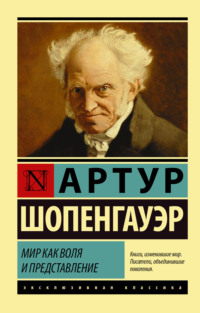 полная версия
полная версияThe World as Will and Idea (Vol. 3 of 3)
But all this reflects light on the instincts and mechanical tendencies of the brutes. They also are, without doubt, involved in a kind of illusion, which deceives them with the prospect of their own pleasure, while they work so laboriously and with so much self-denial for the species, the bird builds its nest, the insect seeks the only suitable place for its eggs, or even hunts for prey which, unsuited for its own enjoyment, must be laid beside the eggs as food for the future larvæ, the bees, the wasps, the ants apply themselves to their skilful dwellings and highly complicated economy. They are all guided with certainty by an illusion, which conceals the service of the species under the mask of an egotistical end. This is probably the only way to comprehend the inner or subjective process that lies at the foundation of the manifestations of instinct. Outwardly, however, or objectively, we find in those creatures which are to a large extent governed by instinct, especially in insects, a preponderance of the ganglion system, i. e., the subjective nervous system, over the objective or cerebral system; from which we must conclude that they are moved, not so much by objective, proper apprehension as by subjective ideas exciting desire, which arise from the influence of the ganglion system upon the brain, and accordingly by a kind of illusion; and this will be the physiological process in the case of all instinct. For the sake of illustration I will mention as another example of instinct in the human species, although a weak one, the capricious appetite of women who are pregnant. It seems to arise from the fact that the nourishment of the embryo sometimes requires a special or definite modification of the blood which flows to it, upon which the food which produces such a modification at once presents itself to the pregnant woman as an object of ardent longing, thus here also an illusion arises. Accordingly woman has one instinct more than man; and the ganglion system is also much more developed in the woman. That man has fewer instincts than the brutes and that even these few can be easily led astray, may be explained from the great preponderance of the brain in his case. The sense of beauty which instinctively guides the selection for the satisfaction of sexual passion is led astray when it degenerates into the tendency to pederasty; analogous to the fact that the blue-bottle (Musca vomitoria), instead of depositing its eggs, according to instinct, in putrefying flesh, lays them in the blossom of the Arum dracunculus, deceived by the cadaverous smell of this plant.
Now that an instinct entirely directed to that which is to be produced lies at the foundation of all sexual love will receive complete confirmation from the fuller analysis of it, which we cannot therefore avoid. First of all we have to remark here that by nature man is inclined to inconstancy in love, woman to constancy. The love of the man sinks perceptibly from the moment it has obtained satisfaction; almost every other woman charms him more than the one he already possesses; he longs for variety. The love of the woman, on the other hand, increases just from that moment. This is a consequence of the aim of nature which is directed to the maintenance, and therefore to the greatest possible increase, of the species. The man can easily beget over a hundred children a year; the woman, on the contrary, with however many men, can yet only bring one child a year into the world (leaving twin births out of account). Therefore the man always looks about after other women; the woman, again, sticks firmly to the one man; for nature moves her, instinctively and without reflection, to retain the nourisher and protector of the future offspring. Accordingly faithfulness in marriage is with the man artificial, with the woman it is natural, and thus adultery on the part of the woman is much less pardonable than on the part of the man, both objectively on account of the consequences and also subjectively on account of its unnaturalness.
But in order to be thorough and gain full conviction that the pleasure in the other sex, however objective it may seem to us, is yet merely disguised instinct, i. e., sense of the species, which strives to maintain its type, we must investigate more fully the considerations which guide us in this pleasure, and enter into the details of this, rarely as these details which will have to be mentioned here may have figured in a philosophical work before. These considerations divide themselves into those which directly concern the type of the species, i. e., beauty, those which are concerned with physical qualities, and lastly, those which are merely relative, which arise from the requisite correction or neutralisation of the one-sided qualities and abnormities of the two individuals by each other. We shall go through them one by one.
The first consideration which guides our choice and inclination is age. In general we accept the age from the years when menstruation begins to those when it ceases, yet we give the decided preference to the period from the eighteenth to the twenty-eighth year. Outside of those years, on the other hand, no woman can attract us: an old woman, i. e., one who no longer menstruates, excites our aversion. Youth without beauty has still always attraction; beauty without youth has none. Clearly the unconscious end which guides us here is the possibility of reproduction in general: therefore every individual loses attraction for the opposite sex in proportion as he or she is removed from the fittest period for begetting or conceiving. The second consideration is that of health. Acute diseases only temporarily disturb us, chronic diseases or cachexia repel us, because they are transmitted to the child. The third consideration is the skeleton, because it is the basis of the type of the species. Next to age and disease nothing repels us so much as a deformed figure; even the most beautiful face cannot atone for it; on the contrary, even the ugliest face when accompanied by a straight figure is unquestionably preferred. Further, we feel every disproportion of the skeleton most strongly; for example, a stunted, dumpy, short-boned figure, and many such; also a halting gait, where it is not the result of an extraneous accident. On the other hand, a strikingly beautiful figure can make up for all defects: it enchants us. Here also comes in the great value which all attach to the smallness of the feet: it depends upon the fact that they are an essential characteristic of the species, for no animal has the tarsus and the metatarsus taken together so small as man, which accords with his upright walk; he is a plantigrade. Accordingly Jesus Sirach also says (xxvi. 23, according to the revised translation by Kraus): “A woman with a straight figure and beautiful feet is like columns of gold in sockets of silver.” The teeth also are important; because they are essential for nourishment and quite specially hereditary. The fourth consideration is a certain fulness of flesh; thus a predominance of the vegetative function, of plasticity; because this promises abundant nourishment for the fœtus; hence great leanness repels us in a striking degree. A full female bosom exerts an exceptional charm upon the male sex; because, standing in direct connection with the female functions of propagation, it promises abundant nourishment to the new-born child. On the other hand, excessively fat women excite our disgust: the cause is that this indicates atrophy of the uterus, thus barrenness; which is not known by the head, but by instinct. The last consideration of all is the beauty of the face. Here also before everything else the bones are considered; therefore we look principally for a beautiful nose, and a short turned-up nose spoils everything. A slight inclination of the nose downwards or upwards has decided the happiness in life of innumerable maidens, and rightly so, for it concerns the type of the species. A small mouth, by means of small maxillæ, is very essential as specifically characteristic of the human countenance, as distinguished from the muzzle of the brutes. A receding or, as it were, cut-away chin is especially disagreeable, because mentum prominulum is an exclusive characteristic of our species. Finally comes the regard for beautiful eyes and forehead; it is connected with the psychical qualities, especially the intellectual which are inherited from the mother.
The unconscious considerations which, on the other hand, the inclination of women follows naturally cannot be so exactly assigned. In general the following may be asserted: They give the preference to the age from thirty to thirty-five years, especially over that of youths who yet really present the height of human beauty. The reason is that they are not guided by taste but by instinct, which recognises in the age named the acme of reproductive power. In general they look less to beauty, especially of the face. It is as if they took it upon themselves alone to impart this to the child. They are principally won by the strength of the man, and the courage which is connected with this; for these promise the production of stronger children, and also a brave protector for them. Every physical defect of the man, every divergence from the type, may with regard to the child be removed by the woman in reproduction, through the fact that she herself is blameless in these respects, or even exceeds in the opposite direction. Only those qualities of the man have to be excepted which are peculiar to his sex, and which therefore the mother cannot give to the child: such are the manly structure of the skeleton, broad shoulders, slender hips, straight bones, muscular power, courage, beard, &c. Hence it arises that women often love ugly men, but never an unmanly man, because they cannot neutralise his defects.
The second class of the considerations which lie at the foundation of sexual love are those which regard psychical qualities. Here we shall find that the woman is throughout attracted by the qualities of the heart or character in the man, as those which are inherited from the father. The woman is won especially by firmness of will, decision, and courage, and perhaps also by honesty and good-heartedness. On the other hand, intellectual gifts exercise no direct and instinctive power over her, just because they are not inherited from the father. Want of understanding does a man no harm with women; indeed extraordinary mental endowment, or even genius, might sooner influence them unfavourably as an abnormity. Hence one often sees an ugly, stupid, and coarse fellow get the better of a cultured, able, and amiable man with women. Also marriages from love are sometimes consummated between natures which are mentally very different: for example, the man is rough, powerful, and stupid; the woman tenderly sensitive, delicately thoughtful, cultured, æsthetic, &c.; or the man is a genius and learned, the woman a goose:
“Sic visum Veneri; cui placet imparesFormas atque animos sub juga aëneaSævo mittere cum joco.”The reason is, that here quite other considerations than the intellectual predominate, – those of instinct. In marriage what is looked to is not intellectual entertainment, but the production of children: it is a bond of the heart, not of the head. It is a vain and absurd pretence when women assert that they have fallen in love with the mind of a man, or else it is the over-straining of a degenerate nature. Men, on the other hand, are not determined in their instinctive love by the qualities of character of the woman; hence so many Socrateses have found their Xantippes; for example, Shakspeare, Albrecht Dürer, Byron, &c. The intellectual qualities, however, certainly influence here, because they are inherited from the mother. Yet their influence is easily outweighed by that of physical beauty, which acts directly, as concerning a more essential point. However, it happens, either from the feeling or the experience of that influence, that mothers have their daughters taught the fine arts, languages, and so forth in order to make them attractive to men, whereby they wish to assist the intellect by artificial means, just as, in case of need, they assist the hips and the bosom. Observe that here we are speaking throughout only of that entirely immediate instinctive attraction from which alone love properly so called grows. That a woman of culture and understanding prizes understanding and intellect in a man, that a man from rational reflection should test and have regard to the character of his bride, has nothing to do with the matter with which we are dealing here. Such things lie at the bottom of a rational choice in marriage, but not of the passionate love, which is our theme.
Hitherto I have only taken account of the absolute considerations, i. e., those which hold good for every one: I come now to the relative considerations, which are individual, because in their case what is looked to is the rectification of the type of the species, which is already defectively presented, the correction of the divergences from it which the chooser's own person already bears in itself, and thus the return to the pure presentation of the type. Here, then, each one loves what he lacks. Starting from the individual constitution, and directed to the individual constitution, the choice which rests upon such relative considerations is much more definite, decided, and exclusive than that which proceeds merely from the absolute considerations; therefore the source of really passionate love will lie, as a rule, in these relative considerations, and only that of the ordinary and slighter inclination in the absolute considerations. Accordingly it is not generally precisely correct and perfect beauties that kindle great passions. For such a truly passionate inclination to arise something is required which can only be expressed by a chemical metaphor: two persons must neutralise each other, like acid and alkali, to a neutral salt. The essential conditions demanded for this are the following. First: all sex is one-sided. This one-sidedness is more distinctly expressed in one individual than in another; therefore in every individual it can be better supplemented and neutralised by one than by another individual of the opposite sex, for each one requires a one-sidedness which is the opposite of his own to complete the type of humanity in the new individual that is to be produced, the constitution of which is always the goal towards which all tends. Physiologists know that manhood and womanhood admit of innumerable degrees, through which the former sinks to the repulsive gynander and hypospadæus, and the latter rises to the graceful androgyne; from both sides complete hermaphrodism can be reached, at which point stand those individuals who, holding the exact mean between the two sexes, can be attributed to neither, and consequently are unfit to propagate the species. Accordingly, the neutralisation of two individualities by each other, of which we are speaking, demands that the definite degree of his manhood shall exactly correspond to the definite degree of her womanhood; so that the one-sidedness of each exactly annuls that of the other. Accordingly, the most manly man will seek the most womanly woman, and vice versâ, and in the same way every individual will seek another corresponding to him or her in degree of sex. Now how far the required relation exists between two individuals is instinctively felt by them, and, together with the other relative considerations, lies at the foundation of the higher degrees of love. While, therefore, the lovers speak pathetically of the harmony of their souls, the heart of the matter is for the most part the agreement or suitableness pointed out here with reference to the being which is to be produced and its perfection, and which is also clearly of much more importance than the harmony of their souls, which often, not long after the marriage, resolves itself into a howling discord. Now, here come in the further relative considerations, which depend upon the fact that every one endeavours to neutralise by means of the other his weaknesses, defects, and deviations from the type, so that they will not perpetuate themselves, or even develop into complete abnormities in the child which is to be produced. The weaker a man is as regards muscular power the more will he seek for strong women; and the woman on her side will do the same. But since now a less degree of muscular power is natural and regular in the woman, women as a rule will give the preference to strong men. Further, the size is an important consideration. Little men have a decided inclination for big women, and vice versâ; and indeed in a little man the preference for big women will be so much the more passionate if he himself was begotten by a big father, and only remains little through the influence of his mother; because he has inherited from his father the vascular system and its energy, which was able to supply a large body with blood. If, on the other hand, his father and grandfather were both little, that inclination will make itself less felt. At the foundation of the aversion of a big woman to big men lies the intention of nature to avoid too big a race, if with the strength which this woman could impart to them they would be too weak to live long. If, however, such a woman selects a big husband, perhaps for the sake of being more presentable in society, then, as a rule, her offspring will have to atone for her folly. Further, the consideration as to the complexion is very decided. Blondes prefer dark persons, or brunettes; but the latter seldom prefer the former. The reason is, that fair hair and blue eyes are in themselves a variation from the type, almost an abnormity, analogous to white mice, or at least to grey horses. In no part of the world, not even in the vicinity of the pole, are they indigenous, except in Europe, and are clearly of Scandinavian origin. I may here express my opinion in passing that the white colour of the skin is not natural to man, but that by nature he has a black or brown skin, like our forefathers the Hindus; that consequently a white man has never originally sprung from the womb of nature, and that thus there is no such thing as a white race, much as this is talked of, but every white man is a faded or bleached one. Forced into the strange world, where he only exists like an exotic plant, and like this requires in winter the hothouse, in the course of thousands of years man became white. The gipsies, an Indian race which immigrated only about four centuries ago, show the transition from the complexion of the Hindu to our own.38 Therefore in sexual love nature strives to return to dark hair and brown eyes as the primitive type; but the white colour of the skin has become a second nature, though not so that the brown of the Hindu repels us. Finally, each one also seeks in the particular parts of the body the corrective of his own defects and aberrations, and does so the more decidedly the more important the part is. Therefore snub-nosed individuals have an inexpressible liking for hook-noses, parrot-faces; and it is the same with regard to all other parts. Men with excessively slim, long bodies and limbs can find beauty in a body which is even beyond measure stumpy and short. The considerations with regard to temperament act in an analogous manner. Each will prefer the temperament opposed to his own; yet only in proportion as his one is decided. Whoever is himself in some respect very perfect does not indeed seek and love imperfection in this respect, but is yet more easily reconciled to it than others; because he himself insures the children against great imperfection of this part. For example, whoever is himself very white will not object to a yellow complexion; but whoever has the latter will find dazzling whiteness divinely beautiful. The rare case in which a man falls in love with a decidedly ugly woman occurs when, besides the exact harmony of the degree of sex explained above, the whole of her abnormities are precisely the opposite, and thus the corrective, of his. The love is then wont to reach a high degree.
The profound seriousness with which we consider and ponder each bodily part of the woman, and she on her part does the same, the critical scrupulosity with which we inspect a woman who begins to please us, the capriciousness of our choice, the keen attention with which the bridegroom observes his betrothed, his carefulness not to be deceived in any part, and the great value which he attaches to every excess or defect in the essential parts, all this is quite in keeping with the importance of the end. For the new being to be produced will have to bear through its whole life a similar part. For example, if the woman is only a little crooked, this may easily impart to her son a hump, and so in all the rest. Consciousness of all this certainly does not exist. On the contrary, every one imagines that he makes that careful selection in the interest of his own pleasure (which at bottom cannot be interested in it at all); but he makes it precisely as, under the presupposition of his own corporisation, is most in keeping with the interest of the species, to maintain the type of which as pure as possible is the secret task. The individual acts here, without knowing it, by order of something higher than itself, the species; hence the importance which it attaches to things which may and indeed must be, indifferent to itself as such. There is something quite peculiar in the profound unconscious seriousness with which two young persons of opposite sex who see each other for the first time regard each other, in the searching and penetrating glance they cast at one another, in the careful review which all the features and parts of their respective persons have to endure. This investigating and examining is the meditation of the genius of the species on the individual which is possible through these two and the combination of its qualities. According to the result of this meditation is the degree of their pleasure in each other and their yearning for each other. This yearning, even after it has attained a considerable degree, may be suddenly extinguished again by the discovery of something that had previously remained unobserved. In this way, then, the genius of the species meditates concerning the coming race in all who are capable of reproduction. The nature of this race is the great work with which Cupid is occupied, unceasingly active, speculating, and pondering. In comparison with the importance of his great affair, which concerns the species and all coming races, the affairs of individuals in their whole ephemeral totality are very trifling; therefore he is always ready to sacrifice these regardlessly. For he is related to them as an immortal to mortals, and his interests to theirs as infinite to finite. Thus, in the consciousness of managing affairs of a higher kind than all those which only concern individual weal or woe, he carries them on sublimely, undisturbed in the midst of the tumult of war, or in the bustle of business life, or during the raging of a plague, and pursues them even into the seclusion of the cloister.
We have seen in the above that the intensity of love increases with its individualisation, because we have shown that the physical qualities of two individuals can be such that, for the purpose of restoring as far as possible the type of the species, the one is quite specially and perfectly the completion or supplement of the other, which therefore desires it exclusively. Already in this case a considerable passion arises, which at once gains a nobler and more sublime appearance from the fact that it is directed to an individual object, and to it alone; thus, as it were, arises at the special order of the species. For the opposite reason, the mere sexual impulse is ignoble, because without individualisation it is directed to all, and strives to maintain the species only as regards quantity, with little respect to quality. But the individualising, and with it the intensity of the love, can reach so high a degree that without its satisfaction all the good things in the world, and even life itself, lose their value. It is then a wish which attains a vehemence that no other wish ever reaches, and therefore makes one ready for any sacrifice, and in case its fulfilment remains unalterably denied, may lead to madness or suicide. At the foundation of such an excessive passion there must lie, besides the considerations we have shown above, still others which we have not thus before our eyes. We must therefore assume that here not only the corporisation, but the will of the man and the intellect of the woman are specially suitable to each other, in consequence of which a perfectly definite individual can be produced by them alone, whose existence the genius of the species has here in view, for reasons which are inaccessible to us, since they lie in the nature of the thing in itself. Or, to speak more exactly, the will to live desires here to objectify itself in a perfectly definite individual, which can only be produced by this father with this mother. This metaphysical desire of the will in itself has primarily no other sphere of action in the series of existences than the hearts of the future parents, which accordingly are seized with this ardent longing, and now imagine themselves to desire on their own account what really for the present has only a purely metaphysical end, i. e., an end which lies outside the series of actually existing things. Thus it is the ardent longing to enter existence of the future individual which has first become possible here, a longing which proceeds from the primary source of all being, and exhibits itself in the phenomenal world as the lofty passion of the future parents for each other, paying little regard to all that is outside itself; in fact, as an unparalleled illusion, on account of which such a lover would give up all the good things of this world to enjoy the possession of this woman, who yet can really give him nothing more than any other. That yet it is just this possession that is kept in view here is seen from the fact that even this lofty passion, like all others, is extinguished in its enjoyment – to the great astonishment of those who are possessed by it. It also becomes extinct when, through the woman turning out barren (which, according to Hufeland, may arise from nineteen accidental constitutional defects), the real metaphysical end is frustrated; just as daily happens in millions of germs trampled under foot, in which yet the same metaphysical life principle strives for existence; for which there is no other consolation than that an infinity of space, time, and matter, and consequently inexhaustible opportunity for return, stands open to the will to live.









